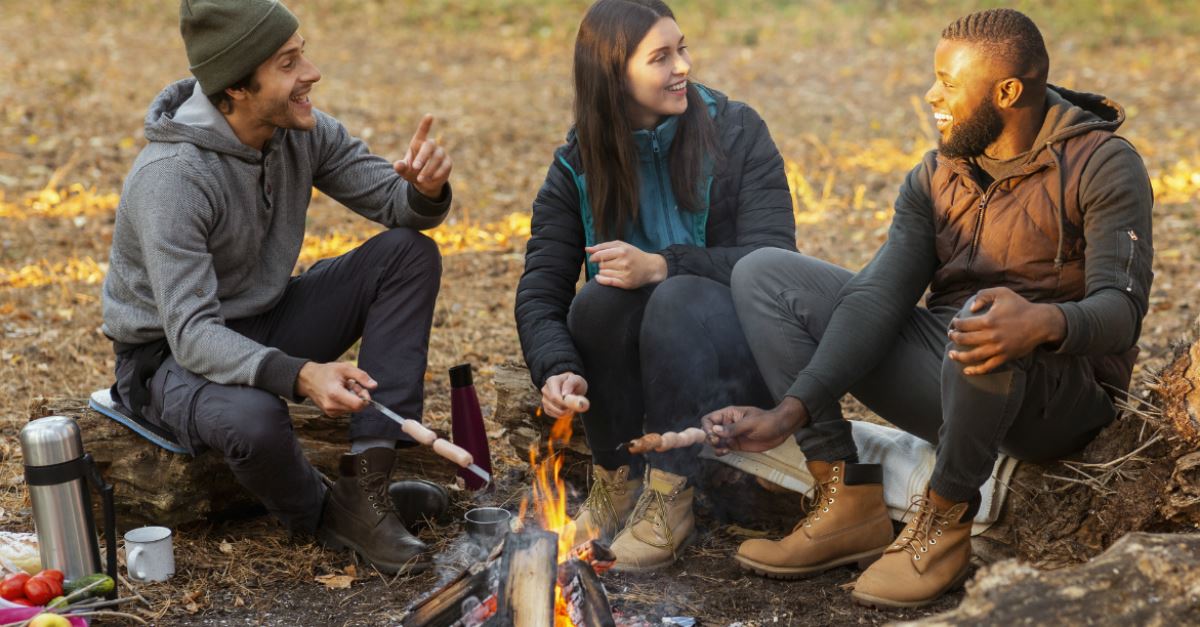3 Steps toward Feeling Thankful on Thanksgiving When You're Sad

I looked around the table, and all I saw were the empty chairs. My kids were there. My husband was there. And I’m so very thankful for them.
Nevertheless, there was a gaping hole where my parents and siblings had been. The green bean casserole reminded me of my gramma who I only met twice and who died the year before. The sweet potato casserole reminded me of my mom, and how as a kid, I’d only eat the marshmallows off the top. I remembered how my abusive dad preferred wild rice, and how one year he decided to smoke the Thanksgiving turkey. Was that the same year he’d begun to beat me? I couldn’t remember.
Do you have memories like this that somehow seem to bring an extra helping of sorrow to the holiday table?
Maybe, like me, your mind tends to organize memories in order of pain rather than chronologically. It was all so long ago, yet feels like yesterday. Sweet memories tainted by sorrow. Nostalgia for a painful past.
I’m guessing I may not be alone in feeling depressed around the holidays. They can be a time of grieving and loneliness for many. A time for remembering not only what was, but what could have been, and what should have been. I mourn the dream of a loving father, and the grandparents my kids will never have. I mourn the relationships that can never be ‘normal’ because they were formed in abnormality.
We All Need Refreshment from Sorrow
Eventually, I decided: I need to feel joy on the holidays again. I need rest for a heart exhausted by sorrow. Maybe you know the feeling? When your soul is drowning in tears, you need a gasp of relief. Peace, like oxygen, can refill lungs that feel crushed under the weight of pain and loss.
I used to view my heart like a scale. I thought if I put enough happiness on one side, it could outweigh the pain on the other side. But no matter how much joy and love I feel, the pain remains...like rotten potatoes in a pantry polluting my whole being.
That’s when I realized that instead of outweighing my sorrow, I needed to remove it by changing it into something else. Instead of pretending my grief wasn’t there, I need to transform my grief into gratitude.
To help you in thanking God, we created a 30 Days of Gratitude Prayer Guide HERE. Download and print this guide to keep with you as a reminder of God's love and promises.
Here are three steps for feeling thankful on Thanksgiving even when you’re sad:
1. Remember It’s Okay to Mourn
Sometimes, tears of sorrow or tears of rage are appropriate and logical responses to tragedy and evil. In fact, if we were not saddened or angered, something would almost certainly be wrong.
Whether you’re grieving the loss of a loved one, or a relationship that has died; whether you’re sad because you don’t have family, or because your family doesn’t love you; it’s okay to mourn when sad or bad things happen.
There’s going to be a grieving season. You’re going to have to process that loss, betrayal, sorrow, or regret. You’re going to need time to sort your feelings out and express them. And that’s okay.
Give yourself permission to grieve. Give yourself permission to cry on Christmas. Give yourself permission to weep on Thanksgiving. Invite the peace that God replaces it with when you cast your cares on Him.

Photo Credit: ©GettyImages/Prostock-Studio
2. Create New Traditions
Traditions are powerful things. They remind us of our past. But if our past is painful, they can anchor us in grief. For several years, my husband and I have been changing up our holiday traditions. One year, shortly after I’d had a baby, we catered tamales for Christmas dinner. That was the year I realized how much emotional power food has.
Since then, I can’t eat a tamale without being reminded of my cuddly newborn baby, long days lazing on the sofa by the Christmas tree, and late nights watching my husband try to convince our infant daughter that bottles really aren’t that bad.
Be open to overhauling your Thanksgiving menu. I’m sure the Pilgrims would have loved fajitas, or pot roast, or macaroni and cheese. They didn’t have grocery stores or restaurants nearby, but you do!
Plan something that makes you feel warm and cozy. Ditch the turkey, or stuffing, or whatever else tastes like sadness. Make yourself new memories, and celebrate the blessings of your new life.
Implement activities that make you happy. You cannot force yourself to feel thankful when you’re repeating traditions that remind you of loss. Replace those old traditions with new traditions that remind you of peace and fill you with joy. Instead of watching football like you did with your alcoholic uncle, maybe play boardgames like you did with your nice grandma. Instead of baking cookies like you did with your judgmental mom, YouTube how to make baklava.
It may take a few years for these new traditions to become nostalgic, but eventually you’ll look back and remember happy memories from recent years and draw joy from the customs you’ve built out of hope.
3. Thank God for the Heartbreak
There’s a song by Downhere that goes, “Thank You for the heartbreak. Thank You for the pain. Thank You for the sadness on the gloomy days of rain. Thank You that the hard times have a reason and rhyme. Thank You that the healing makes the beauty shine.”
For a long time, I didn’t understand what that meant. It’s taken a lot of spiritual growth, and a lot of hard work, but I’ve finally gotten to a place in my recovery process where I can look back and see how overcoming suffering has strengthened me. I can thank God for shepherding me through the Valley of the Shadow of Death.
You see, if I hadn’t had a dysfunctional dad who manipulated, berated, and harassed me, I might not be so protective of my own daughters. I might not be so careful about how they’re treated. I might not be so conscious of all the ways my attitudes, behaviors, and words could color their perception of themselves. I might not be able to work alongside my husband to guide our family in ways that avoid those unhealthy pitfalls I know so well.
I’m not saying abuse benefitted me. I’m saying surviving by the grace of God did.
Like a desert flower that’s endured droughts, floods, blazing days, and freezing nights, survivors are strengthened by experience. We remain strong when circumstances grow difficult. We can identify unhealthy behavior, because we’ve seen those behaviors taken to extremes. We can cope with hardship, because we’ve coped with hardship. We endure and overcome, because we’ve done it all before. We are tough as nails, because we’ve been through the furnace.
And because of this, we are empowered to encourage others in tough situations too. We can weep with those who weep, build up the broken, and bear one another’s burdens. We know exactly how pain feels, so we avoid harming others. We can sympathize with those who feel isolated and brokenhearted.
Recently, my daughter was bullied at school. Now, I don’t know what most parents would have done. I don’t know how I’d have reacted differently had I never survived domestic violence or verbal abuse. But because of my experience, I remained calm. I was able to empathize with my child, be still with her, and give her the encouragement she needed right then. I was able to tell her that her bully’s sin was not her fault, that their insults were lies, and that only God can heal their heart.
And the most beautiful thing I could ever imagine has come out of that incident. We notified her teacher and spoke with the principal, but my daughter, who is only seven years old, decided to pray for her bully. Because she knows her bully is a liar. Because she knows her bully is sinning. Because she knows only Jesus can fix a sinful heart. Because her mommy was bullied too. And so, every morning before school and every night before bed, we look to God for hope, healing, and salvation, both for ourselves and for our enemies.
Trust that God Will Reveal Blessings
So, you see, we don’t have a God who lets sorrow go to waste. Rather, he works all things together for the good of those who love him (Romans 8:28). Even the wickedness of abusive loved ones, the poison of gossips and liars, the jealousy of bullies, and the darkness of this world, is used by him to accomplish his righteous holy will.
Knowing this, you can ask God to transform your sadness into thankfulness this season. And you may notice that you’re thankful to have survived what was hurting you. Thankful for the friends and family that nurture you, who are blessings from Him. Thankful that heartbreak leads to healing.
Whether your sadness is due to broken relationships, or some other sin or sorrow, it’s comforting to know that our God transforms. He changes death into life, oppression into victory, weakness into strength, tears of sorrow into tears of joy, and a cross of condemnation into assurance of salvation.

Photo Credit: ©GettyImages/evgenyatamanenko
Originally published October 28, 2021.





